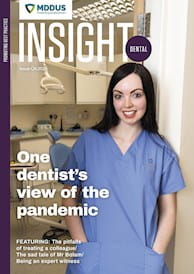
MORAL distress has always been an area of interest to me. I have been fortunate that many clinicians have shared their experiences and the impact of those with me over the years. They have spoken with openness and generosity, but also with significant distress that is frequently rooted in an ethical problem. The causes and circumstances vary as much as the individuals, but they have a common theme: being prevented from working to the standards and values that underpin clinical practice. The barriers are usually systemic, including limited resources, hierarchical structures, a damaging working culture or political expediency.
Since the start of the pandemic, commentators, such as Simon Wessely, Mary Doherty and Neil Greenberg, have warned of the risks and effects of moral injury during Covid-19. The origins of moral injury are in military service and much of what we know and understand derives from the impact of war. My friend and colleague, Suzanne Shale, has reflected on the wider context of healthcare and reminded us that moral injury can extend beyond practitioners to affect patients, carers, non-clinical staff and families. It occurs wherever our ethical expectations or those of a profession are compromised or breached.
Moral injury is likely to lead to moral distress, and empirical studies conducted during the last year, both in the UK and beyond, have found that levels of moral distress are, unsurprisingly, high. Moral distress may be internalised or it may manifest in burnout, cynicism, poor health and compassion fatigue. Its reach is deep and wide – never more so than in a pandemic that is uncertain and seemingly without end. It deserves to be taken seriously.
What then does “taking it seriously” mean? One of the most important steps is first to understand the nature of the injury and ensuing distress. What has happened and what has been its impact? For that initial step to happen, there needs to be an environment in which people ask and care about others and their experiences. There needs as well to be sufficient time, trust and psychological security for people to share their experiences and the impact.
That is easier to write down than it is to achieve. There is something circular and unlikely about cultures that may contribute to, or allow, moral injury and distress also needing to be sufficiently sensitive, open and safe for people to acknowledge and express that distress. This does not mean all is lost, however. A trusted colleague, manager or leader who models that openness both to his or her own experiences and to those of others can make a difference. Giving people the language and confidence to have these conversations is a greater (and rarer) contribution than we may believe.
Nonetheless, even if a thoughtful, supportive and containing space is available to people who begin to learn ways to acknowledge and express moral distress, there is a trap for the unwary. To focus only on individuals and personal interactions is to fail to address the systemic, procedural and structural variables that contribute to moral injury and distress. That matters because it is to risk working at a superficial level that never addresses underlying factors. Worse still, it may impose a sense of responsibility and burden on individuals that is unwarranted, unfair and potentially damaging, especially when people are vulnerable. Yet, systems are complex, opaque and unwieldy. Moreover, how does an individual who is experiencing moral distress (or a colleague who is concerned about someone) engage with the system to effect change?
The task whilst daunting is not a lost cause and has inherently ethical dimensions. First, conceptualising our work as being part of a community (of whatever size) that is underpinned by values of reciprocity and solidarity matters. It means that we can together identify systems that damage that community and develop advocacy. It allows us to think, without blame but with purpose, about what is modelled, prioritised, facilitated and impeded by systems. We can name the problems and consequences without exposing individuals.
Secondly, identifying the relationships that influence and control structures and systems allows us to map where we might persuade and hold to account. In so doing, we can think about who has a voice (and who does not) and how we have conversations that allow for the possibility of change. Attending to trust and legitimacy are central, enabling us to identify not only sources of credible support but also to develop practical interventions that have reach. Trust and legitimacy are integral to ethical leadership, which must prioritise moral distress in strategic and operational decision-making.
Moral distress is not merely an abstract concept. It is, in every sense, vital to clinicians and to anyone seeking health and social care. Attending to it is essential to our recovery from the pandemic. It could not be more timely or important.
Deborah Bowman is Emeritus Professor of Bioethics, Clinical Ethics and Medical Law at St George’s, University of London
This page was correct at the time of publication. Any guidance is intended as general guidance for members only. If you are a member and need specific advice relating to your own circumstances, please contact one of our advisers.
Read more from this issue of Insight Dental

Save this article
Save this article to a list of favourite articles which members can access in their account.
Save to library